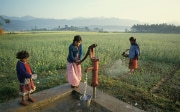
Switzerland will contribute to mainstreaming climate change mitigation and adaptation for better preparedness and resilience to climate change-related impacts. To reduce greenhouse gas emissions, it will support and develop the capacities of relevant institutions and stakeholders at different levels to introduce energy efficiency measures, and will promote greater use of renewable energy. Authorities will be supported to undertake integrated urban planning and development. Switzerland will also continue to engage in the advancement of water sector reforms. An important focus will be on integrated resources management and wastewater treatment in order to protect and efficiently utilise water resources, thus improving the aquatic environment and the overall status of water resources in Kosovo. The corporate development of RWCs to ensure sustainable operations and maintenance as well as climate resilience will be a particular focus.


